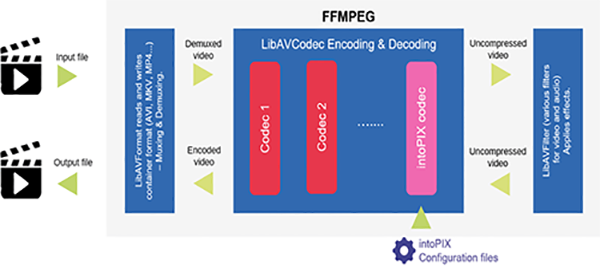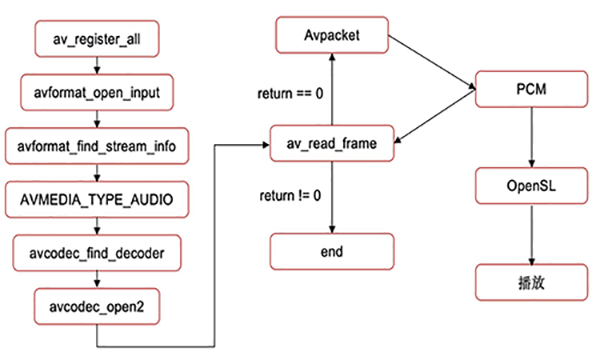What Is FFmpeg?
FFmpeg is the leading multimedia framework, able to decode, encode, transcode, mux, demux, stream, filter and play pretty much anything that humans and machines have created. It supports the most obscure ancient formats up to the cutting edge. No matter if they were designed by some standards committee, the community or a corporation. It is also highly portable: FFmpeg compiles, runs, and passes our testing infrastructure FATE across Linux, Mac OS X, Microsoft Windows, the BSDs, Solaris, etc. under a wide variety of build environments, machine architectures, and configurations.
FFmpeg Work Flow.

Tonmind PA System Lite Software uses FFMpeg for audio format conversion and sampling rate conversion when transmitting speech with IP Speaker. It can support MP3, G722, OPUS encoding and so on.
The Different Libraries Provided By FFmpeg.
libavcodec encoding/decoding library
libavfilter graph-based frame editing library
libavformat I/O and muxing/demuxing library
libavdevice special devices muxing/demuxing library
libavutil common utility library
libswresample audio resampling, format conversion and mixing
libpostproc post processing library
libswscale color conversion and scaling library
Tonmind PA System and Tonmind Audio Manager software use libavCodec and libavFormat for Audio and video encoding and decoding and use libswresample for Audio data Resample processing to avoid sound quality loss as far as possible, which ensures providing best sound quality for Tonmind SIP Speaker.
Versioning And Compatibility.
Each of the FFmpeg libraries contains a version.h header, which defines a major, minor and micro version number with the LIBRARYNAME_VERSION_{MAJOR,MINOR,MICRO} macros. The major version number is incremented with backward incompatible changes - e.g. removing parts of the public API, reordering public struct members, etc. The minor version number is incremented for backward compatible API changes or major new features - e.g. adding a new public function or a new decoder. The micro version number is incremented for smaller changes that a calling program might still want to check for - e.g. changing behavior in a previously unspecified situation.
FFmpeg guarantees backward API and ABI compatibility for each library as long as its major version number is unchanged. This means that no public symbols will be removed or renamed. Types and names of the public struct members and values of public macros and enums will remain the same (unless they were explicitly declared as not part of the public API). Documented behavior will not change.
In other words, any correct program that works with a given FFmpeg snapshot should work just as well without any changes with any later snapshot with the same major versions. This applies to both rebuilding the program against new FFmpeg versions or to replacing the dynamic FFmpeg libraries that a program links against.
However, new public symbols may be added and new members may be appended to public structs whose size is not part of public ABI (most public structs in FFmpeg). New macros and enum values may be added. Behavior in undocumented situations may change slightly (and be documented). All those are accompanied by an entry in doc/APIchanges and incrementing either the minor or micro version number.
FFmpeg Development Interface Call Flow.

Via application of FFMpeg to convert sound quality frequency coding and resampling, Tonmind PA System Lite software enables excellent sound quality and no sound quality loss. Customers can apply the software for efficient management of Tonmind SIP Paging Speaker.

